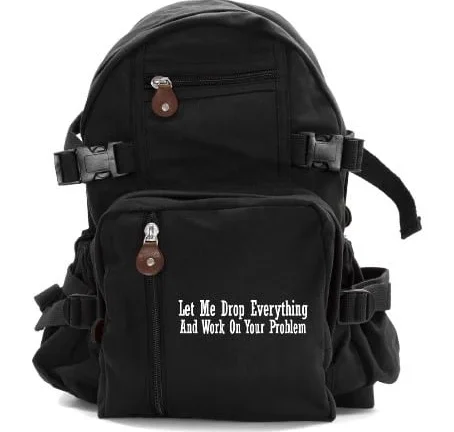The airlines do not care if we are going to be away from home for one hour or one year, baggage is evil and must be stowed away (for a fee).
One of the worst parts of traveling is the luggage part. Airlines have almost made it a sin (for which we must be punished) to have even one bag bigger than a wallet. The airlines do not care if we are going to be away from home for one hour or one year, baggage is evil and must be stowed away (for a fee), hidden as soon as we enter the cabin (with limited space), almost impossible to access during flight, and bounced and dropped by handlers as we wait (ever more anxiously) for our precious stuff to show up on the carousel after a flight. When did luggage become immoral and wicked?
Losing It
In the SITA Baggage Report (2017), 5.73 bags per thousand passengers were lost in 2016. The reason that more bags did not stray is thanks to new technologies and process improvements by airlines and airports. Aviation IT specialists expect the lost luggage issues to decrease over the coming months as a result of IATA Resolution 753 – effective as of June 2018. The policy requires member airlines (80 percent of total scheduled global air traffic), to keep track of every item of baggage at 4 mandatory points:
- Check-in
- During aircraft loading
- During transfers between aircraft
- Upon arrival – when delivered back to passenger
The Weakest Link
Many pieces of luggage are lost when passengers change planes. In 2016, 47 percent of all cases of delayed bags occurred between connecting flights, especially those with small time frames. Misplaced baggage is more than annoying to passengers, it is expensive to the airlines as recovering and returning lost bags costs the aviation industry $2.1 billion (2016).
Technology
The hope for the future is based on RFID tracking – making Resolution 753 an industry-wide reality. The SITA Baggage Report estimates the cost of implementing RFID at $0.10 per passenger, generating a savings of $0.20 per passenger. RFID could save the industry more than $3 billion over the next 7 years by improving baggage management and operations, and, of course, improve the quality of life for the passengers.
Before the Airline
It is reassuring to note that our dearly loved bags may soon have a better chance of joining us as we travel, however, we are still faced with a problem: what to do with the luggage between the time we check out of a hotel or a B&B and arrive at the airport (or train/bus station).
In the “old days” the hotel concierge would stow the bags for a minimal charge (or tip), allowing guests the freedom to explore for the day, return for their precious cargo, and head to the station. Today, many hotels have ceased this service under the guise of liability.

There was a time hotel management permitted late check-outs (up to 4 PM) to accommodate guests with late transportation departures. Currently, unless you have a special credit card, or received dispensation from a manager, the opportunities to linger in your room and stay close to your luggage, are non-existent…you are expected to have vacated your room by 1 PM (the latest).
Even if the hotel permits you to leave your bags to explore, it is likely that the accommodations are located in remote areas – not even close to the nearby city, park, mountain, mall – you want to investigate.
So, the question remains: what to do with luggage in that time/space continuum between the hotel check-out and the transportation check-in.
Horns of a Dilemma
What to do? Your flight does not leave for many hours, the airline will not permit early check-in and even if you wanted to hang out at the airport, airlines may not permit early check-ins.
Enter Vertoe: A Luggage Concierge Service

Sid Khattri and Neha Kesarwani, Vertoe Founders
An overnight success story (that has taken two years to fund), started when two enterprising millennials had their own dismal experience (schlepping 3 large pieces of luggage around Los Angeles). They knew that there must be a way to get rid of the luggage for a few hours, at a minimal expense, that would also sight-seeing without being tethered to their bags.
Without a clue on how to keep the sightseeing and delete the luggage Khattri and Kesarwani discarded idea after idea until they came up with Vertoe – the place to drop your luggage while sightseeing, attending business meetings, or catching up with friends and family, at a nominal charge, that was convenient, safe and doable.

On the plus side, Khattri is charming and enthusiastic and comes with an impressive IT background (Google liked him so much they moved him from India to New York). It is his sense of being “on target,” that has convinced funding sources to invest in the Vertoe idea. Investors include TechStars, Ingwe Capital and ff Venture Capital (seed-stage firm supporting visionary founders), along with a collection of “angels.”
With 100+ locations include New York City, Boston, Washington, DC, and Philadelphia, Vertoe offers a convenient and safe way to store your stuff at local neighborhood shops, in the areas you want to visit. The partner shops are manually verified for safety and customers receive a free unique coded tampe- proof seal when the items are placed at the location. To make customers feel even more secure, $3000 in insurance is provided for stowed items. Luggage space is reserved online, the public space address is sent and the daily fee is paid via a credit card.
The allocated space for your bag (or bags) will be inside local shops who have extra space. Each location is verified as trustworthy and the staff of the store/shop/gym is trained by the Vertoe staff before becoming authorized to accept bags.
Vertoe will store your bag with pricing that starts at $5.95 per day/item (with a few variations based on location). Want to store your luggage for a longer period of time? Weekly and monthly discounts are available. Want to cancel your reservation? No problem, just contact Vertoe by email.

What to Stow
You can leave just about anything at a Vertoe authorized location, as long as it is legal and does not require feeding or walking. If it is toxic, polluted or explosive – leave it home. If the Vertoe partner suspects that there is something illegal residing in your luggage, clients may be asked to open the bag for inspection. If the partner is not comfortable with the contents, the bag will be refused and the fee refunded.

Pick It Up
Should you be unable to retrieve your own bags, it is necessary to contact Vertoe’s support team and provide written permission for your authorized representative to pick up and/or drop off your items. The person(s) must present a valid photo ID and a Vertoe number so the staff can verify the change in plans.
Going Forward
It is delightful to know that the word “luggage” is not as evil as it used to be, thanks to Vertoe. Of course, the best idea is to travel-lite. If you continue to use the Ms. Piggy approach to packing (take it all), then Vertoe will become your new BFF.
© Dr. Elinor Garely. This copyright article, including photos, may not be reproduced without written permission from the author.





